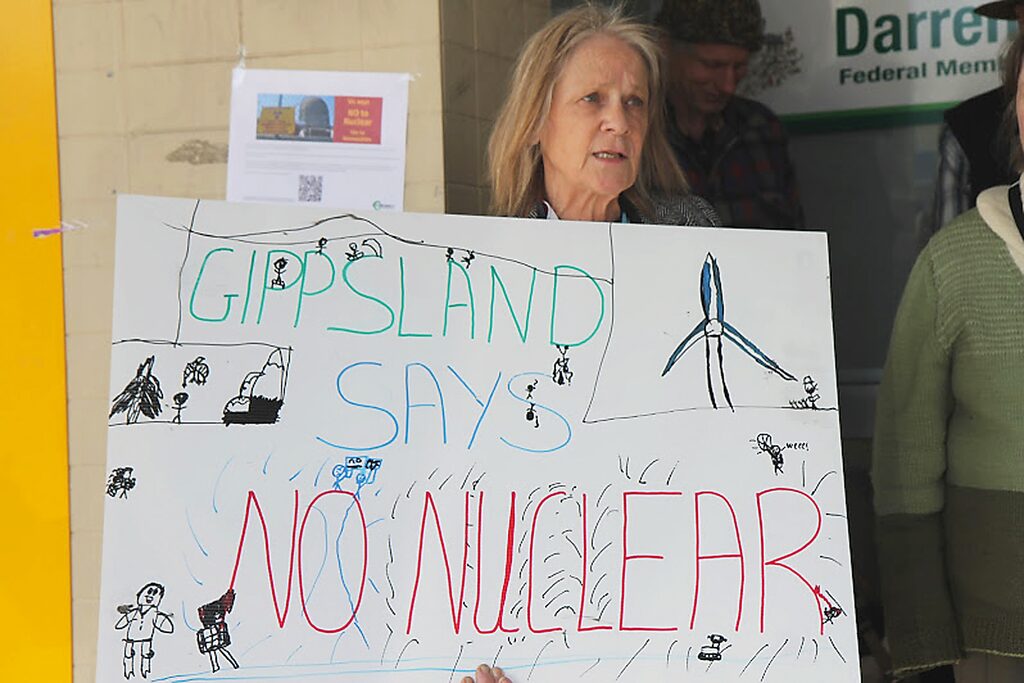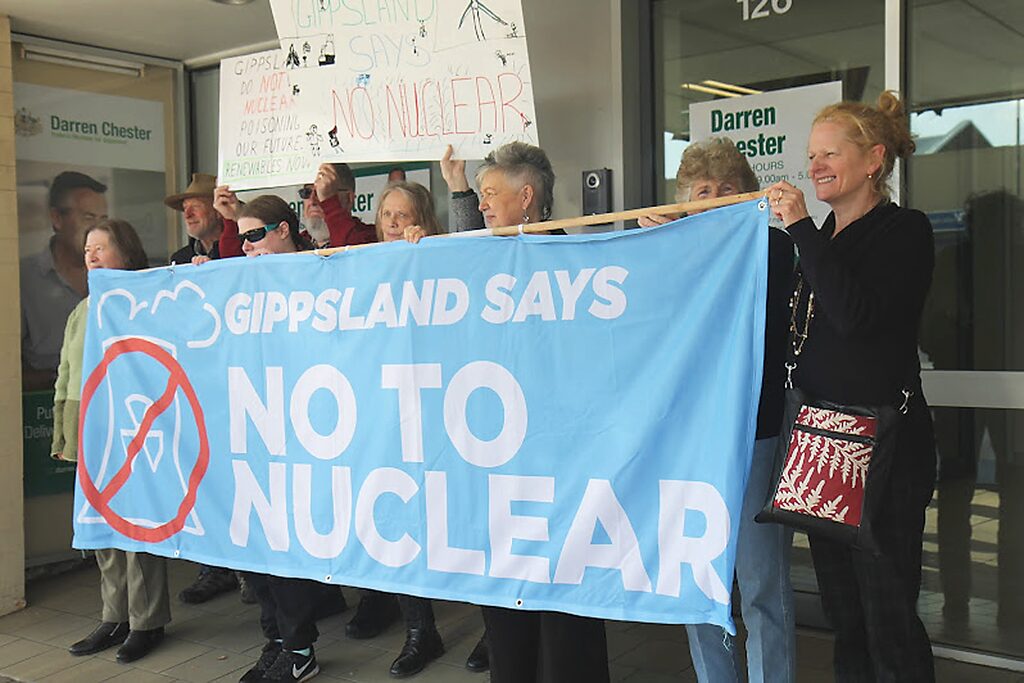By KATRINA BRANDON
NO sooner had the Opposition Leader, Peter Dutton, announced the nuclear policy, than about 15 people protested against the policy in front of Federal Member for Gippsland, Darren Chester’s Traralgon office.
Discouraging the use of nuclear, the crowd stood in front of the empty office, sharing signs saying, “No nuclear in the Valley. Gippsland says no”.
Wendy Farmer, the protest organiser and a member of Friends of the Earth and Voice of the Valley, voiced her concerns.
She said the renewable changes, which were already in progress and had been presented to the public with promises of job creation and regional development, were now overshadowed by the nuclear proposal.
“Darren Chester was all for offshore wind. He helped push his party for legislation for the wind industry. They said it was good for opportunities, they said that it was good for jobs, they said that it was good for regional communities. All of a sudden, nuclear has come into the mix, and the Coalition has said that nuclear was the way to go. We call it a nuclear fantasy,” she said.
“We were never consulted, and we say ‘No to nuclear’. Darren Chester claims to be here for the community, but today, he is nowhere to be seen.”
Ms Farmer said the Latrobe Valley sits on a fault line and was already unstable in areas due to mining, and that $50 billion had already been committed to renewable projects in this region. Adding that if a radiation accident was to happen, no one could do anything in time to stop the everlasting damages that come from the exposure.

Ms Farmer also said the Latrobe Valley was already cleaning up the “mess” of rehabilitating mines and that future generations would be left to clean up any nuclear disasters, suffering worse effects than caused by the Hazelwood mine fire that lasted 45 days.
“There is always a chance of an accident. Imagine if an accident happens. Our kids are at school when the accident happens. By the time that you have collected your kids, it is too late. They are already impacted, they are already suffering, and they will eventually die from radiation and nuclear,” Ms Farmer said.
“If a wind turbine fails, it might catch fire, but if a nuclear farm fails, the whole area becomes uninhabitable forever. It’s time to stop that, keep our kids at home, and have the next generations fill the communities in Latrobe Valley. We cannot leave a mess and the possibility that our kids and the future generations have to stand here and actually be doing the same thing that we are doing here.”
Margie Barrett, a volunteer from Environment Victoria, said that Mr Dutton’s decision was more of a distraction from “real” discussions around climate change and how to realistically face the challenges to bring about a better outcome for everybody.
“There has not been enough consultations with the community. I mean, who has been down here talking to the community wanting nuclear? Who has been doing that? Nobody,” she said.
“We are forgotten. Yes, we will take your coal, and now we will leave you with a rehabilitation problem. Now, we will leave you with nuclear here, leaving you with more health problems and more poor outcomes for the environment and our population.
“I don’t think people really listen. I think they need to come down and listen to people and both sides of the story because I don’t think we have been getting both sides of the story.”
During the protest, a big factor for most of the group was the relationship between sustainability and climate change and whether there would be everlasting effects, such as affecting local farms.
Some Facebook comments have shown fears of the Chernobyl and Fukushima incidents, and others state that enough has been learned to prevent similar occurrences since then.
A local Morwell member of the Latrobe Valley Sustainability Group, Lorraine Bull, said that in a recent radio nuclear conversation, she heard that farmers living near nuclear plants in the United Kingdom had to constantly check their products for radiation.
She then voiced her concerns about how Latrobe Valley and surrounding areas are heavily involved in the Victorian agricultural industry.
Ms Bull also said: “In 15 years, a wild bushfire season over the summer may become normal if we don’t do anything about reducing emissions.”
“They are not the government; if that is their policy, I never want to see them. This is a critical decade now, and we need to reduce emissions so that we don’t get the worst impacts of climate change. Who is going to invest in them? Who is going to want to pay double the price for their electricity because some ‘nutter’ can get a few votes out of it,” she said.












